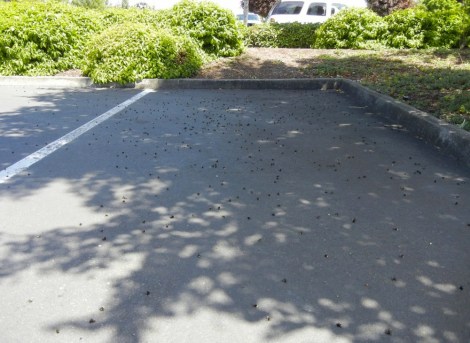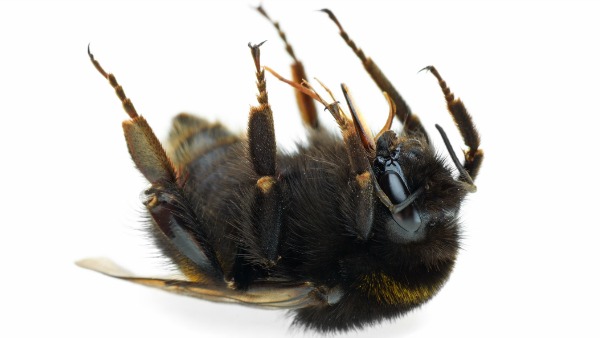National Pollinator Week began grimly Sunday when tens of thousands of dead bumblebees, honeybees, ladybugs, and other insects were discovered blanketing a shopping plaza’s parking lot just off Interstate 5 in Wilsonville, Ore.
Bumblebees were the species hardest hit, with an estimated 25,000 dead and 150 colonies lost outside a Target store. “They were literally falling out of the trees,” said Rich Hatfield, a conservation biologist with the nonprofit Xerces Society for Invertebrate Conservation. “To our knowledge this is one of the largest documented bumblebee deaths in the Western U.S. It was heartbreaking to watch.”
It turns out that landscapers had sprayed the lot’s 65 European linden trees on Saturday with the insecticide Safari. The insecticide is marketed by manufacturer Valent as “a super-systemic insecticide with quick uptake and knockdown.”

Rich Hatfield / The Xerces SocietyA carpet of dead bumblebees in a Target parking lot.
Xerces sampled the dead bees and concluded that the landscaping company that sprayed the insecticide was to blame. State investigators say they won’t be ready to pin the blame on the landscapers until they have investigated other pesticide applications in the area. From Oregon Public Broadcasting:
“[The landscaping company] made a huge mistake, but unfortunately this is not that uncommon,” said [Xerces Executive Director Scott Hoffman] Black. “Evidently they didn’t follow the label instructions. This should not have been applied to the trees while they’re in bloom.”
However, [Oregon Department of Agriculture] Communications Director Bruce Pokarney said his agency hasn’t confirmed that the pesticide sprayed on Saturday is the cause of the bee die-off.
“I don’t think we’re there yet,” he said. “We’re looking at any other pesticide applications that might have taken place in the area that might have come into play. Until we get all that figured out, we stop short of saying this is the culprit or the likely culprit. It’s one of the possibilities we’re looking at. A very strong possibility.”
Not tragic enough yet? From KATU:
The trees were still attracting bees Wednesday but soon they dropped to the ground and struggled for their last breaths.
The Oregon Department of Agriculture is still deciding what to do with the trees — netting or repellants were being discussed.
Did we mention that it’s National Pollinator Week? That’s an opportunity to celebrate and publicize the critical role of bees in ecosystems and on farms — like the many berry farms in Oregon’s Willamette Valley.
The annual event is sponsored by a long list of companies, among them many pesticide manufacturers. That includes Valent.




